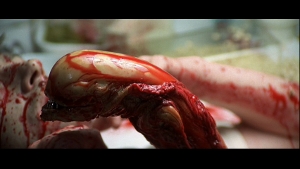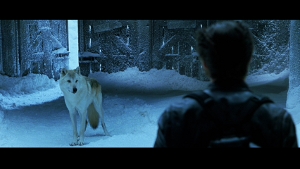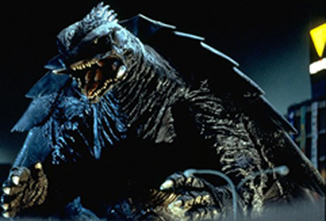 Until 1995, Gamera was the joke: about as low as you could go in the land of Giant Monsters…unless you went to the real out-of-the-way backwaters, like Hong Kong, or South Korea. He was, at best, a Godzilla rip-off, and even nerds like us look down on those. The fire-breathing clown palled around with the kids when he should have been out handing Tokyo its ass. Oh, sure, he saved the world…but from what? A giant salamander with an opal fetish? A telepathic shark from Outer Space? A star fish? I mean, c’mon. Even the Flash has better villains.
Until 1995, Gamera was the joke: about as low as you could go in the land of Giant Monsters…unless you went to the real out-of-the-way backwaters, like Hong Kong, or South Korea. He was, at best, a Godzilla rip-off, and even nerds like us look down on those. The fire-breathing clown palled around with the kids when he should have been out handing Tokyo its ass. Oh, sure, he saved the world…but from what? A giant salamander with an opal fetish? A telepathic shark from Outer Space? A star fish? I mean, c’mon. Even the Flash has better villains.
It was easy to pick on Gamera. It was fun. Not so easy any more. Because Gamera has become the pinnacle. The new high water mark in giant monster cinema. In Gamera 3, the wave broke, just in time for the Millennium. Remember when the world ended? Yeah, so do I. Remember how seriously we all took that? As if it actually mattered? Well, imagine how it felt to our Japanese brothers and sisters. There’s a palatable sense of impending doom throughout Gamera 3, adding weight and drama to the proceedings and turning this story (and its giant turtle protagonist) into more than the sum of their rubbery parts. {More}

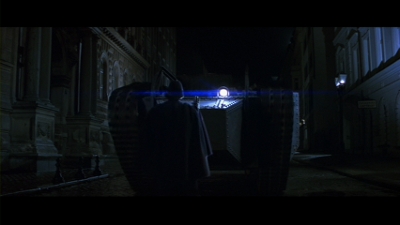 The next industry Uncle Tom who calls Alan Moore out for
The next industry Uncle Tom who calls Alan Moore out for 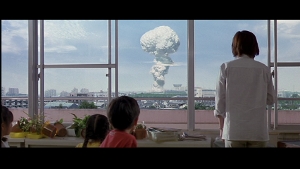 Like most middle-aged men, Godzilla suffers from a deplorable excess of emotional baggage. After fifty years of high highs and low lows his identity has become erratic. Toho, Godzilla’s production company, is currently scrambling to field the movie that will return Godzilla to his rightful place as champion of the giant monster action extravaganza.
Like most middle-aged men, Godzilla suffers from a deplorable excess of emotional baggage. After fifty years of high highs and low lows his identity has become erratic. Toho, Godzilla’s production company, is currently scrambling to field the movie that will return Godzilla to his rightful place as champion of the giant monster action extravaganza.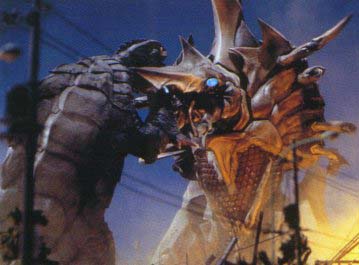 A large meteor
A large meteor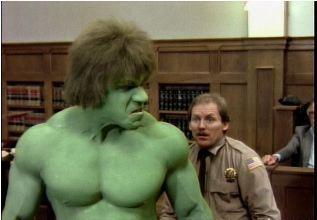 Short and sweet version:
Short and sweet version: I hate modern comedies. Their grotesque obsessions are polluting the very fabric of our culture. We are getting dumber for no reason. It has nothing to do with resources. Thanks to the Farrelly brothers, Jim Carrey, Mike Myers, and the curious cloud of anti-rationality radiation hanging over Los Angeles, Hollywood just throws money at the people who produce gross out comedies. Future film historians will look back and wonder how, each year, as the twenty-first century opened, more production companies wasted so much talent into this cinematic cul-de-sac? I’m not sure what scares me more: the fact that this kind of movie exists, or the fact that it is so popular.
I hate modern comedies. Their grotesque obsessions are polluting the very fabric of our culture. We are getting dumber for no reason. It has nothing to do with resources. Thanks to the Farrelly brothers, Jim Carrey, Mike Myers, and the curious cloud of anti-rationality radiation hanging over Los Angeles, Hollywood just throws money at the people who produce gross out comedies. Future film historians will look back and wonder how, each year, as the twenty-first century opened, more production companies wasted so much talent into this cinematic cul-de-sac? I’m not sure what scares me more: the fact that this kind of movie exists, or the fact that it is so popular.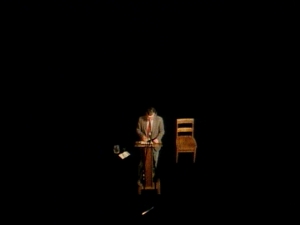 In the summer of The Year 2000, my parents and I embarked upon a European Vacation. After two nights in Paris, circumstances found us in the quiet little town of Bois (pronounced just like it’s spelled…as long as you’re speaking through a mouthful of yogurt). With a few hours to kill before the restaurants opened, I flipped on the TV and found Manufacturing Consent, the almost-three hour documentary profile of MIT Linguistics Professor Noam Chomsky. Filmmakers Mark Achbar and Peter Wintonick followed the man around for four years, taping talk after talk in a variety of countries. They also managed to dig up hours of archival interviews from as far back as the 1960s. All of which is cut-n’-pasted into a one hundred sixty-seven minute primer for anyone too lazy to pick up one of the man’s many (many, many) books.
In the summer of The Year 2000, my parents and I embarked upon a European Vacation. After two nights in Paris, circumstances found us in the quiet little town of Bois (pronounced just like it’s spelled…as long as you’re speaking through a mouthful of yogurt). With a few hours to kill before the restaurants opened, I flipped on the TV and found Manufacturing Consent, the almost-three hour documentary profile of MIT Linguistics Professor Noam Chomsky. Filmmakers Mark Achbar and Peter Wintonick followed the man around for four years, taping talk after talk in a variety of countries. They also managed to dig up hours of archival interviews from as far back as the 1960s. All of which is cut-n’-pasted into a one hundred sixty-seven minute primer for anyone too lazy to pick up one of the man’s many (many, many) books. It’s easy to forget that, once upon a time, all the talking heads dismissed Michael Moore as a “comedian.” God only knows why. There are very few ha-ha moments in Roger & Me…unless the slow, painful death of a community strikes you funny.
It’s easy to forget that, once upon a time, all the talking heads dismissed Michael Moore as a “comedian.” God only knows why. There are very few ha-ha moments in Roger & Me…unless the slow, painful death of a community strikes you funny.